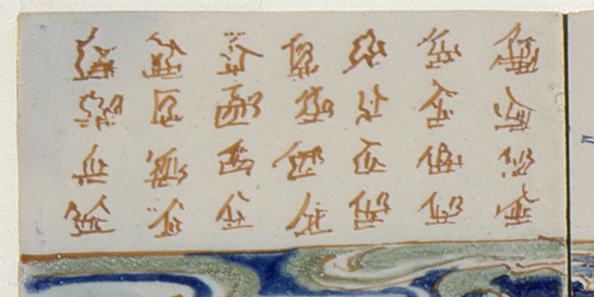Hanzi Smatter circa 1700
 A friend showed me a photograph of a Dutch chinoiserie tile panel from the late 17th-early 18th century, and asked me to help her identify some of the curious scenes represented on it. My eye, however, was immediately drawn to the cartouche in the upper left corner.
A friend showed me a photograph of a Dutch chinoiserie tile panel from the late 17th-early 18th century, and asked me to help her identify some of the curious scenes represented on it. My eye, however, was immediately drawn to the cartouche in the upper left corner.
On first glance, the characters seem to be completely fake (made up). Even after straining my eyes and enlarging the panel, I couldn't recognize a single character.
Since I had gotten hooked on this inscription, I obtained a high resolution photograph showing only that part of the tile panel. Now the "characters" were clearer, and I thought to myself, "My, they look a bit like Jurchen script":
Read the rest of this entry »

 It's been a while since I've posted on Chinglish. In truth, I have an enormous backlog of precious items, some stretching back for years, but I just haven't been able to get to them because I've been trying to concentrate on more substantial topics lately. Today's example, however, is so amazing that I feel inspired to address it immediately.
It's been a while since I've posted on Chinglish. In truth, I have an enormous backlog of precious items, some stretching back for years, but I just haven't been able to get to them because I've been trying to concentrate on more substantial topics lately. Today's example, however, is so amazing that I feel inspired to address it immediately.






